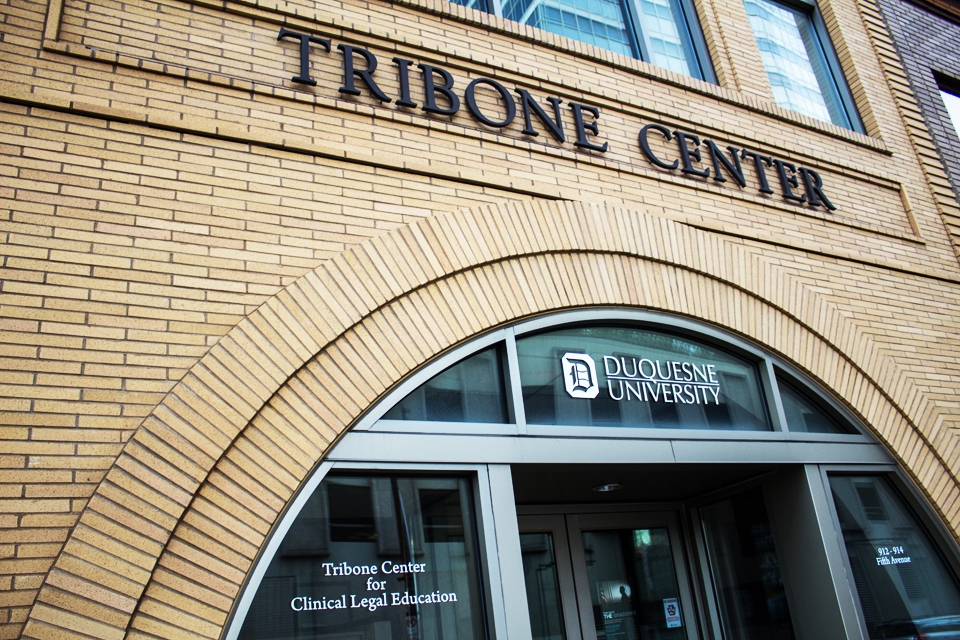
The Tribone Center on Fifth Avenue holds the office for the new Pittsburgh office of the Pennsylvania Innocence Project, which opened in September.

The Tribone Center on Fifth Avenue holds Duquesne’s Juvenile Defender Clinic. The clinic will help residents in Pittsburgh public housing get their juvenile records expunged.
Carolyn Conte | Staff Writer
Duquesne’s Juvenile Defender Clinic won a $100,000 grant to help current or potential public housing residents with juvenile records to attain or keep their homes.
The Department of Housing and Urban Development and the U.S. Department of Justice awarded the money in September to Duquesne law professor Tiffany Sizemore-Thompson’s Juvenile Defender Clinic. Ten law students from the clinic will visit Pittsburgh public housing sites in November to interview and give legal advice to residents.
To expunge — or remove — residents’ juvenile records, the clinic will go through a multistep process with potential clients. First, the clinic must establish that the person qualifies for the services and is “actually eligible to have their juvenile record expunged,” according to Sizemore-Thompson.
The grant requires clients be under 24 years old and at risk of losing their public housing or denied a job. It also prohibits clients who have been found guilty of “certain sex offenses, domestic violence offenses and drug offenses related to methamphetamine,” according to Sizemore-Thompson.
Then, students in the clinic will file the motion for expungement. Legally, a 30 day notice is required for the district attorney, and after that notice is accepted the Court of Common Pleas will convene a hearing.
“Either myself or a certified student attorney will present the motion to the judge for decision,” Sizemore-Thompson said. “Our students do much of the work on these cases from beginning to end.”
According to Sizemore-Thompson, a juvenile record can exclude one from driving privileges, employment, military service, education, public housing and private housing if person, like a landlord or potential employer, is “able to access that information.” A person’s juvenile record becomes public after age 14 in Pennsylvania.
One of the students, second year law student Brianna Sulenski, said the class is currently working on expungement cases for several clients in the Juvenile Defender clinic.
“I’m excited to help them, also because they are [around my age],” she said. “There is no need for these [records] to hold them back.”
Sulenski said she enjoys being able to work ‘hands-on’ with real clients. The students go to court with Sizemore-Thompson, but next semester will play a more active role.
After Sizemore-Thompson found the grant opportunity in an email, she applied in December of 2015. As this was a national grant, Sizemore-Thompson and her clinic competed with other housing authority and legal service teams throughout the country for the grant. When she first applied for the grant, the Juvenile Defender Clinic was brand new.
Therefore, “I thought it would be a great way to increase visibility about one of the services that the clinic provides,” she said. “Thankfully, the Housing Authority was completely on board with the idea and so we co-wrote the application.”
Chief Urban Affairs Officer of the Pittsburgh Housing Authority Valerie McDonald-Roberts said that the grant “really came out of a conversation [with the chief community affairs liaison] about employment.” Roberts would like for residents to not be prevented from work because of these records.
Sulenski shared this concern.
“They are hard working and have families to support, but they are held back from work — even if they are educated — because of old records,” she said.
Roberts said the Housing Authority was eager to work with Duquesne in their efforts to help those with past criminal records.
“The goal is to have [housing residents] be independent,” Roberts said.




